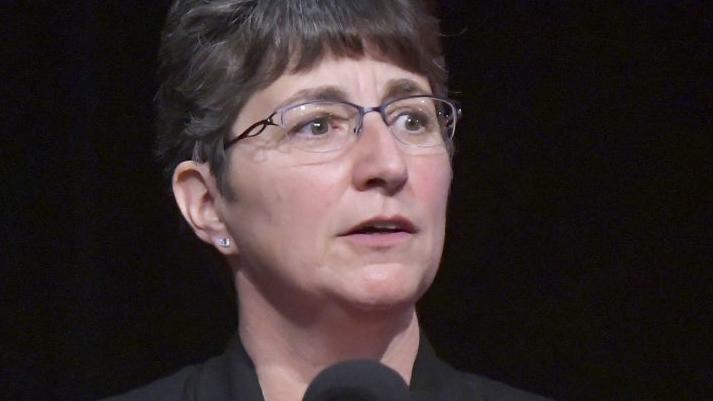Watch Now: New Illinois State University President Starts With Plenty On Her Plate | Local education
Terri Goss Kinzy was named 20th President of Illinois State University on May 14, 2021 and made history as the first ISU woman to fill this role.
NORMAL – Terri Goss Kinzy assumed her role as the 20th President of Illinois State University Thursday, but there won’t be much of a honeymoon for them to get used to the job.
Your first meeting of the ISU Board of Trustees will take place on July 23rd. The university’s proposal to establish a College of Engineering goes to the Illinois Board of Higher Education in August. The fall semester starts on August 16 and Negotiations with the Graduate Workers Union will resume in the fall.
Kinzy, the first female president of the ISU, succeeds Larry Dietz, who retired on Wednesday after 10 years at the ISU. the last seven as president and 50 years in higher education.
“I feel like the state of Illinois needs a little more recognition for what it is and what it has achieved,” she said in an interview. “I’ll talk a lot about the history of the university.”
She wants people – including those who make government funding decisions – to learn more about ISU’s above-average scores Performance in areas such as student retention and graduation rates.
“I’m the daughter of a used car salesman,†she said.
Kinzy also knows how to listen.
“My first priority … is to talk to people and learn about their ISU experiences,” she said.
Kinzy began this process on campus visits since her appointment was announced in May. This includes not only Dietz and the management team, but also people she met on campus, including an ISU police officer and a facility employee.
“There is so much enthusiasm for the future of the institution,” she said. “Everyone I speak to speaks of the high quality of the study experience and the commitment to the students.”
Dietz was “Systematically bring me up to date” in weekly discussions, Kinzy said on budget plans, the College of Engineering proposal, ISU’s response to the COVID-19 pandemic, and other issues.
Upon learning about the budget process and funding flows, Kinzy said, “I was surprised to see Illinois State University has the lowest (state) funding per student in Illinois. “
She said, “We are working hard to make higher education as affordable as possible. … Constant and consistent funding from the state is an important part of this. “
Western Michigan University, where Kinzy was Vice President for Research and Innovation before joining ISU, has had a Teaching Assistants Union since 2006. The last four-year contract was approved in June 2018.
Kinzy said it was a good thing that a federal mediator was involved and she was confident that the negotiators could reach a mutually beneficial deal if talks that had been interrupted by the union resume.
As for the technical proposal, Kinzy noted that “a lot of time, effort and research” has been put into it and “I am confident that it is a significant need”.
She said “a willingness to take a small risk” when proposing a College of Engineering “shows a university that is forward-looking” and manpower-driven.
There is also the issue of the COVID-19 pandemic.
“From what I’ve learned,” said Kinzy, “I’m very impressed with the university’s COVID response … and the scientific methods they used.”
ISU intends to Return to a more traditional college dorm experience this fall, but plans for the transition are still under development, she said.
“As the optimistic person I am, I hope we learn from the COVID-19 experience,” said Kinzy.
Those lessons include having a place to study online, especially when students are away, working or doing an internship for the summer, she said. “This is an opportunity that we shouldn’t miss.”
In addition to telling the history of ISU and following ongoing work such as the engineering school, Kinzy’s priorities include “continuing attention and, equally importantly, maintaining” underrepresented faculties and “stepping up efforts to increase international enrollment”.
Kinzy said she was well aware of “what made Illinois State University a very special place,” adding, “Nobody wants to be the president who took a great institution and made it mediocre.”
She said there are opportunities to make a great institution even better and “those opportunities come from working together”.
Check out the new Illinois laws that went into effect July 1st
665 notes
The Democratic-controlled Illinois General Assembly has passed 665 bills this legislature, with the vast majority awaiting the signature of Governor JB Pritzker.
But Pritzker signed 42 bills. A handful of these will go into effect on January 1, 2022, but most went into effect immediately after being signed or will go into effect this Thursday.
Here are some notable new laws that are in effect now or Thursday that Illinois people should know about.
CAPITOL NEWS ILLINOIS
Electoral reform
With delays in the redistribution of the U.S. census numbers caused by the pandemic, lawmakers have postponed the 2022 state primaries from March 15 to June 28. Legislation also makes Election Day a national holiday and requires that every county have at least one universal voting center and allow people to be added to a permanent mailing list. (SB825)
Photo by Jose M. Osorio, Chicago Tribune
Vote by email

Some changes in voting for the 2020 general election caused by a pandemic, such as: (House bill 1871)
Legal redistribution of land
Since they are mandated every 10 years, lawmakers approved new county boundaries for the Illinois House and Senate. The maps drawn by the Democrats, using the American Community Survey of the U.S. Census instead of waiting for the ten-year census numbers to arrive later this year, have been challenged in court by Republicans and a few other groups. (HB2777)
Photo by Brian Cassella, Chicago Tribune
Illinois Supreme Court reassignment

The seven-member Illinois Supreme Court district lines were successfully redrawn for the first time since the 1960s. (SB642)
Photo by Capitol News Illinois
Police reform
No more controversial law was passed that year than House Law 3653, also known as the SAFE-T Law, which was passed during the Lame Duck this January. The provisions on the termination of the cash deposit and the obligation of all police officers to wear body cameras will not come into force until 2023 and 2025 respectively. But from Thursday the police must provide assistance to the injured, intervene in the event of excessive use of force and limit the use of force. It also provides stricter guidelines for decertifying officers and would allow people to file anonymous complaints about police misconduct. (HB3653)
Payday loan

Lenders are now prohibited from charging more than 36% of the annual interest rate on consumer loans. The average rate in Illinois before the law was signed was nearly 300%. (SB1792)
Vaccination lottery
The state budget for fiscal year 2022 includes $ 10 million for a “vaccine lottery”. All Illinois residents vaccinated by July 1 will automatically be entered into the competition. It includes $ 7 million in cash prizes for vaccinated adults ranging from $ 100,000 to $ 1 million and $ 3 million in scholarships for vaccinated teenagers. (SB2800)
Photo by Antonio Perez, Chicago Tribune
COVID-19 emergency shelter

Creates guidelines for distributing more than $ 1 billion to federal stimulus funds for COVID-related housing assistance. Also creates an automatic sealing of evictions during the pandemic. (SB2877)
Pre-negotiation interest
Victims of personal injury and wrongful death can claim interest from the defendants from the time the action is brought. There should be incentives to resolve these cases. It was supported by the trial attorneys and rejected by business groups. (SB72)
Casino work

All Illinois casino applicants are now required to enter into a project employment contract when applying for a new or renewed license. (SB1360)
Compensation for crime victims
Specifies that a victim’s criminal history or crime does not automatically prevent compensation for the victim or the victim’s family. Extends the applicant’s time to provide the requested information from 30 days to 45 days and provides that a final arbitration award will not exceed $ 45,000 (previously $ 27,000) for a crime committed on or after August 7, 2022 allowed. (HB3295)
Electronic signature

Specifies that a contract, record, or signature cannot be denied validity or enforceability just because it is in electronic form or because an electronic record was used in its creation. Specifies that when a law requires it to be in writing, an electronic record is sufficient for the law. (SB2176)
Contact Lenore Sobota at (309) 820-3240. Follow her on Twitter: @Pg_Sobota


Comments are closed.